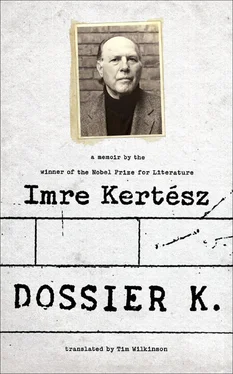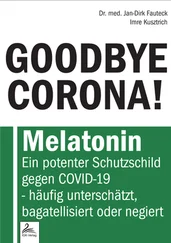You speak about him with such love …
Yes, and the funny thing is I’m surprised by it myself. It seems he had a greater effect on me than I would ever have supposed. Yet we hardly spoke to each other; now I sense that he treated me like one of the more fragile pieces of merchandise that has to be handled with care lest it is broken. I, on my side, was rather afraid of him. In truth he was a rather dour, taciturn man. He would occasionally crack a lame joke. “I know some Latin as well,” he would say. “Listen to this: adduc aqua cingo . A duck a-quacking go.” You had to laugh over that. He had only completed the six years of elementary school that were compulsory at that time. Very rarely, he would go off to synagogue on a Friday evening, but there were other times when he would take me to the Turkish baths in Dandár Street, since there was no bath in his place on Tömő Street, and for the WC one had to go out to the end of the outdoor corridor. There was a big rusty key to it, hanging up on a nail in the kitchen. He never went to the theatre or a cinema. He and Grandma would close up the shop and walk home together. Their supper was invariably the same: matzos crumbled liberally into a mug of milky coffee — you know what matzos are, don’t you?
You bet! A biscuit of unleavened bread .
Well, that’s what they ate every evening. The crumbs of matzo would soak up the milky-brown coffee to produce a sort of pulp of indefinable colour that would then be scooped up out of the mug with a spoon. After that, my grandfather would sit by the window so as not to have to turn the light on, and he would pick his way through a newspaper as evening drew in until it was dark. They went to bed early and got up early; a maidservant cooked them dinner and took it round to them at the Prater Street shop in a nest of blue enamel dinner pails.
You mean to say that even with their modest living conditions they employed a maidservant?
“Serving girl” as my grandfather said. There’s no need to be so surprised: remember, poverty was so rife in the country in those days that it was quite normal for girls to leave home and go into service in Budapest for bread and board and a pittance for pay. I well recall a long string of “Nellies” who served as maids for my grandparents. The dark “main room” had an extension in the form of a lighter annex that they referred to as the “alcove,” where my grandfather and grandmother slept in a vast marriage bed, with my father (until he remarried) at the other end, toward a window that overlooked the Botanical Garden, and me along with Father if I happened to be staying with him. There was a separate kitchen, and that was where the Nellies lived. I was fond of each and every one, and they were fond of me. One of them accustomed me to a taste for cigarettes of the Herczegovina brand, which were made of a light and bright tobacco and had a card mouthpiece. We would sit down next to each other, blowing smoke, at the bottom of the steps: I couldn’t have been more than five or six years old. It was the same Nellie who said to me one summer morning: “I’ll take the young Master off to the butcher’s, and there we’re going to buy some paprika-spiced bacon rind and pickled gherkins and you’ll find out just how scrumptious that is! You’ll be licking your fingers afterward! Only you mustn’t let out a peep about it to anyone.” My grandparents, you see, kept a kosher household, which simply amounted to forbidding themselves from eating any pork product or cooking with pork fat. So, this Nellie was embroiling me in sin, and she watched contentedly as, one after the other, I tucked into the “soldiers” that she sliced off with her own pocket knife and offered to me on its tip. That Nellie must have been rebellious by nature, I supposed, and she did not like my grandfather one bit: “the old skinflint,” was how she referred to him, to my great consternation, because I had no idea what I was supposed to do with such a massive secret. There’s no question that this confidence caused me an identity crisis for a while, because on the one hand I had no wish to betray poor Nellie, but on the other hand I was, after all, more inclined to take grandfather’s side. On top of everything else, she took me off on one occasion to a church service; it must have been some feast day or other, though that’s only now that I think about it, because at the time I had not the least suspicion about where we were going. The afternoon was already dark and sleet was falling. My hand was in Nellie’s, and she was clutching it tightly; she probably had the jitters. “The young Master will see!” I think we went along the Józsefváros end of Üllői Avenue, and we dropped into a church somewhere round there. I partook in the same sort of experience that I was later to recognize in the legend of Parsifal, because a mysterious door opened up before me as it did before Parsifal. I stepped into a dazzling space where a long row of trestle tables laid with spotless white tablecloths had been set up. Nellie and I sat down at one of these. We heard some music and ate something. A jingling priest in a spotless white robe came. I had no idea where I was or what was happening, but I was transfixed by a peculiar sense of wonderment and rapture; I was turned totally inside-out.
Or else it was your first encounter with a religious experience .
No, I don’t think it was a religious experience; mystic, but not religious. Incidentally, I feel the same way about these things to this day: I’m prone to mystic experiences, but dogmatic faith is totally alien to me.
But surely the purpose of religion is precisely to mediate mystery in order that one partakes of the mystery .
You may well be right, because religious feeling in my view is a human necessity, regardless of whether a person is religious or not, whether or not one is a member of a religious community; indeed, whether one believes in god or not.
And do you, for instance, believe in god?
On the spur of the moment, I can’t give you an answer; not that it matters, because I harbour a natural religious sentiment the same as others; after all, one feels obliged to be thankful to somebody for this life, even if there happens to be no one who would be able to acknowledge those thanks.
I would gladly dispute that, but let’s move on. The …
Forgive me for cutting in, but I never finished what I was going to say about the Nellies. There was another Nellie who was very fond of taking me out in the free air, though now that I think back on it, that was more than likely on account of a suitor of hers. I seem to recall some sort of uniform that would pop up in the background, then hastily vanish before Nellie took my hand to set off home, though I couldn’t say if it was a tram conductor’s, a policeman’s, or a soldier’s. That took place somewhere behind the grounds of the Ludovika Military Academy, in Népliget — the People’s Park. As we neared the fairground booths, my ears would be assailed from a long way off by the crackle of music coming from the loudspeakers that were slung up from the enormous trees. They would pour out the hit songs of the day, like “In Toledo two times two is four / To be in Toledo you just have to adore …,” or “Fine-cut is a top-notch pipe t’baccy / My chum won’t smoke anything that’s wacky …,” and the like. In front of the puppet show there would be a row of rough-and-ready benches on which would be perched a similar audience, many children, too. I was quite capable of watching for hours as László the Valiant beat the Devil about the head with an enormous frying pan, so it was no problem for Nellie to slip away from beside me. My other favourite was Susie Cabbage, who would tell jokes on a tiny stage nearby, but rumour had it that she was actually a man, which rather put me off. That, anyway, was how those afternoons in the People’s Park were spent.
Читать дальше












